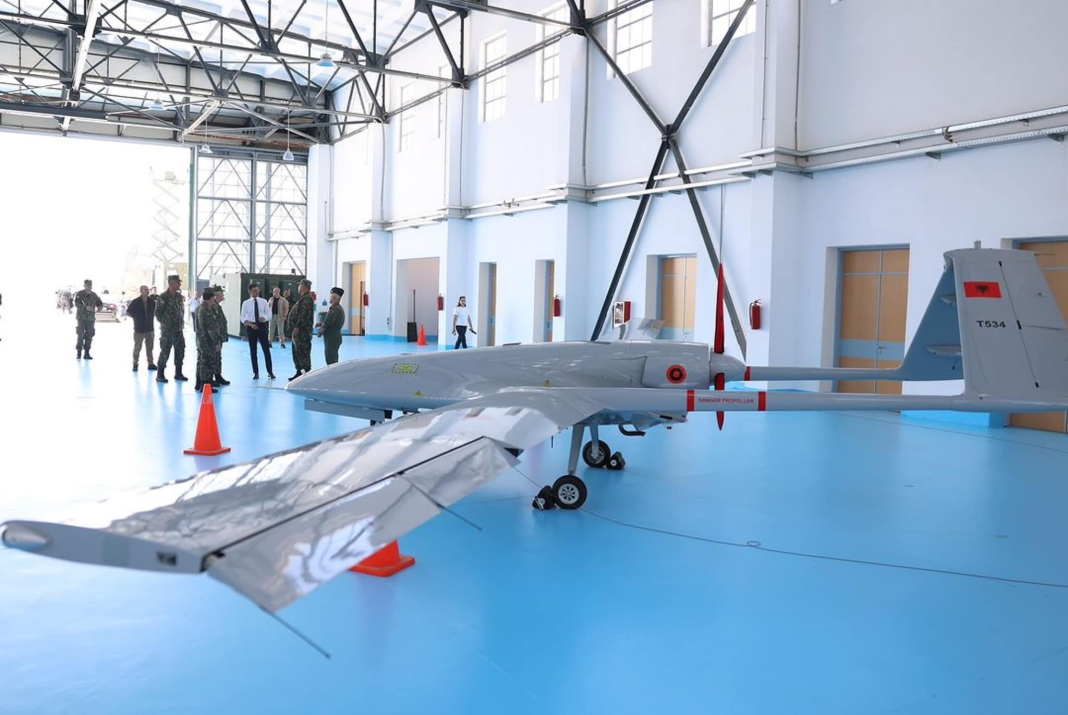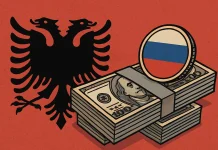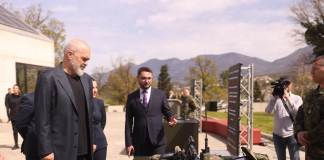Vjolanda Peca
‘Albanian drones flew over Gjakova to spy on us’ was a nearly identical headline across several major Albanian news portals in early July, referencing a statement by Serbian President Aleksandar Vučić.
An analysis of several monitored portals on July 3 and 4, 2024, reveals that the content of the news was also nearly identical, with reports based solely on Vučić’s statement published by Serbian media, without any verification of the claim.


‘We have identified flights of Albanian ‘Bayraktars’ from Djakovica on June 5 and 20 at an altitude of 5,800 meters, intended to scout the positions of the Serbian Armed Forces,’ Vučić was quoted as saying by monitored media.
The report sparked confusion as to whether Vučić was referring to drones from Albania or Kosovo, as both countries have purchased such drones from Turkey.
Vučić: Albania’s drones spied on us,’ reported an Albanian television station.
Whom did Vučić accuse?
A search for the original report from which the news spread in Albanian media revealed that the Serbian tabloids Kurir and Danas had published almost identical articles.
Vučić’s statement by the Serbian newspaper Danas.
Screenshot of the news from Kurir, July 3, 2024
Vučić’s statement by the Serbian newspaper Kurir (Translation from Serbian using Google Translate)
According to Kurir, the description identifies the drones as bearing the Albanian flag, which strengthens the perception that Vučić is accusing Albania of using them for espionage.
The drones were launched from Kosovo within its own borders
While there was no official response from Albania regarding Vučić’s claim, the Ministry of Defense of Kosovo quickly confirmed that Bayraktar drones were flown on June 5 and 20 but rejected the accusation of espionage.
‘… the ‘Bayraktar’ drones, part of the armament system… and inventory of the KSF, are an integral part of the KSF’s operational units. We have an unmanned aerial systems unit within the KSF that operates the ‘Bayraktar’ drones. Naturally, their operations occur within the territory of the Republic of Kosovo, with no intention of surveilling any neighboring country or violating the airspace of any country,’ said Kosovo’s Minister of Defense, Enver Maqedonci, according to Kosovar media.
Even in Vučić’s statement, first published in Serbian media and later copied by Albanian outlets, it is acknowledged that the drones, including Swedish or German ones, were operated in non-Serbian territory, in line with UN Resolution 1244. Nevertheless, Albanian media have either deliberately or inadvertently amplified Vučić’s narrative that Serbia is being spied on.
Context
The latest claim by Serbian President Vučić, known for disseminating sensationalist narratives that target Albania, Kosovo, or even the West as threats to Serbia (as previously verified by Faktoje), was made during a meeting of the General Staff of the Serbian Armed Forces. This occasion allowed Vučić to make several statements, notably including narratives suggesting that Serbia needs to bolster its military to better counter external threats.
Vučić’s Narratives Under Expert Analysis
Agim Nesho, a career ambassador and Balkan affairs specialist, considers this to be a fabrication created by Serbian nationalists as part of a strategy to enhance the Serbian military. In a discussion on A2 CNN, Nesho remarked:
‘Vučić has succeeded in arming Serbia to 110% of the total armament possessed not just by neighboring countries but by the entire Western Balkans. He (Vučić) is preparing a scenario that he initially attempted with the events in Banjskë, which failed. It would be similar to the Crimean scenario, where people were repressed and sought help to justify an ‘intervention based on human rights.’ They (the Serbs) are waiting for Russia to win in Ukraine and return to the Balkans, which interests both Russia and their own situation.’
Meanwhile, Nikola Petrovic, director at the International Security and Affairs Center (ISAC), suggests that both parties are simply looking for justifications to blame each other.
‘As someone with a background in the security sector, I am certain that these drones have conducted reconnaissance in both Serbia and Kosovo—and this is not problematic as long as they have not breached Serbian airspace. The key point is that as long as certain rules are followed, such espionage missions are considered ‘low-level,’ especially with Bayraktar drones, which have limited capability with their optical equipment at an operational altitude of about 5,500 meters!’ Petrovic added.
Faktoje, based on reports in Albanian media claiming the drones are from Albania, contacted the Ministry of Defense for information. As of this article’s publication, we have not received a response.
Conclusion
President Vučić’s claim that the Serbian military is being spied on by Albanian drones is unsupported by evidence and facts. This assertion was extensively propagated by Albanian media through copy-pasting, without considering the consequences of these narratives. Experts on geopolitical issues explain that such claims serve Serbia’s agenda to enhance its military supremacy in the Western Balkans, using tactics similar to Russia’s approach in annexing Ukraine.
*This article is part of the regional initiative Western Balkans Center Against Disinformation.
Edited by: Viola Keta & Aimona Vogli










